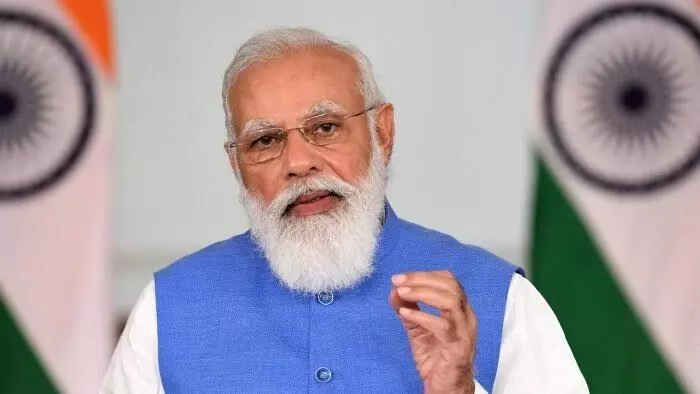
After the Minister of Minority Affairs, now the ministry itself to go?
text_fieldsPhoto taken on the occasion of Smriti Irani taking over charge of Ministry of Minority Affairs from Mukhtar Abba Naqvi (photo credit: Hindustan Times)
Going by reports in the national media, a move is afoot to abolish the Ministry of Minority Affairs in the Central Government and bring its programs under the Central Department of Social Justice and Empowerment. Mukhtar Abbas Naqvi, who was the only Muslim in the Central Cabinet, and was managing the Minority Affairs portfolio, was virtually dismissed by the BJP when his term in the Rajya Sabha ended. The charge of the department was then given to Women and Child Development Minister Smriti Irani. Now the ministry itself is being totally abolished as per the reports. The UPA government formed a Ministry of Minority Affairs as a separate entity out of the Ministry of Social Justice and Empowerment to give more attention to the problems of the Muslim, Christian, Buddhist, Sikh, Parsi and Jain communities. When the functions of that are being merged with the larger department, the intention of the government is very clear: that minorities should not been seen as a distinct class and that they should not be given special rights, benefits or incentives. Although the Central government has issued a one-line statement denying the report, that is not enough to allay the apprehensions about the termination of the ministry, particularly when the BJP, which questions the very concept of minorities as a class, keeps repeating its stance.
A nation and a government show their civil and humanitarian characteristics through the care and consideration it gives to the backward sections of religious and caste groups, women, children and the elderly. It is only when a government takes along with it people of all strata as one that it can make governance smooth , the administration stable and the country prosperous. Realising this, Manmohan Singh appointed the Sachar Committee to compile comprehensive data about the Muslim minority who were socially marginalized and did not receive government attention in the country; based on its recommendations, reforms like the Prime Minister's 15-point program were also introduced. However, the Sangh Parivar parties, who opposed the special treatment for minority sections envisioned by the architects of the nation, opposed such social reform moves 'tooth and nail' - in Modi's own words. After the Sachar Report, which revealed the real plight of Indian Muslims, the then Prime Minister Manmohan Singh earmarked a certain percentage of funds for minority welfare in the 11th Five Year Plan. However, at the 54th National Development Committee meeting in December 2007, Narendra Modi, who was then the Chief Minister of Gujarat, raised his voice against this. The BJP's stand was that government assistance should be offered only on the basis of economic status and any religious and caste consideration deserved no place in it. Obviously, the BJP's main concern was not applying religious or caste considerations as such, but the benefit it would confer on minorities including Muslims through such schemes. It is but natural that the party raising such objections would not brook the existence of a special ministry dedicated to the welfare of minorities.
Given the declared policies of the BJP government, which does not accept the existence of a minority, there is nothing unusual in the BJP's stand. The very word 'minority' has been anathema to the BJP. When Najma Hibatullah and Mukhtar Abbas Naqvi were serving as ministers in this ministry in the BJP regime, they have openly expressed their rejection of minority consideration. Historically, the Minority Affairs Ministry has been offering several schemes such as the Prime Minister's Fifteen-Point Programme as the follow-up of Sachar Committee Report, various scholarships, Maulana Azad National Fellowship, interest subsidy on loans for study abroad, free coaching, financial assistance to candidates preparing for UPSC, SSC Mains and PSC Exams etc. The Ministry provides several incentive schemes for growth, all aimed at educational uplift. Also, as part of economic empowerment, PM Vikas, Seekho Aur Kamao and Ustad schemes provide financial assistance in vocational training and employment enterprises. Assistance is also provided for the development of infrastructure facilities under the Prime Minister's Janavikas Karyakram. Multifaceted projects and programs such as National Waqf Development Plan, Financial Assistance for Urban Waqf Projects, Geo Parsi especially for the Parsis, Hamari Dharohar and Nai Roshni National Women Leadership Training Scheme for Parsis are formulated and implemented under the Ministry. Although the actions of the government are axiomatically slow, it is a fact that after the establishment of the minority department, the results of these benefits and incentives have been reflected in the educational progress of the minority groups and in the employment sector. But now the Centre's reported move to abolish the department will nullify all that. The decision about abolishing the special ministry for minorities will also be a test of how the Prime Minister and his party treat them in actual practice, even as the government repeats a hundred times the slogan 'sabka saath, sabka vikas' - representing inclusive development. There is no doubt that this is part of the Sangh Parivar agenda of alienating Muslims which it started at the party and government levels, to the entire segment of minorities as a whole.

























